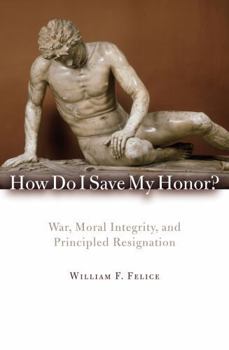How Do I Save My Honor?: War, Moral Integrity, and Principled Resignation
Select Format
Select Condition 
Book Overview
How Do I Save My Honor? is a powerful exploration of individual moral responsibility in a time of war. When individuals conclude that their leaders have violated fundamental ethical principles, what are they to do? Through the compelling personal stories of those in the U.S. and British government and military who struggled with these thorny issues during the war in Iraq, William F. Felice analyzes the degrees of moral responsibility that public...
Format:Paperback
Language:English
ISBN:0742566676
ISBN13:9780742566675
Release Date:August 2009
Publisher:Rowman & Littlefield Publishers
Length:240 Pages
Weight:0.85 lbs.
Dimensions:0.7" x 6.1" x 8.8"
Customer Reviews
2 ratings
Everything old is new again
Published by Thriftbooks.com User , 15 years ago
It's amazing how the same moral questions continue to crop up throughout history. William Felice has writen an insightful treatise that puts the decisions surrounding the invansion of Iraq into a well researched historic perspective. Drawing on similar examples of moral and ethical dilemmas, he sheds new light on the actions and reactions of several individuals who found themselves conflicted between their duty to country and their duty to humanity. Highly recommended.
An excellent study of a perennial political issue
Published by Thriftbooks.com User , 15 years ago
William Felice has written a smart, engaging study of a continually recurring political-moral problem: when someone serves in office and deeply believes that his/her government is embarked upon a deeply troubling course of action, what is the best response? Felice argues for what he calls "an ethic of principled resignation." He gives a survey of several classic positions in moral philosophy to help sort out some of the issues, but in many ways the most engaging parts of the book come out of the interviews he conducted with various American and British officials who resigned in protest of policies their governments embarked on after 9-11. This book is not another "Iraq book," although it does use debates (and resignations) coming out of that conflict as a lens through which to view the larger dilemma that Felice is engaging. No review can capture the way the author does such a good job of weighing the difficult moral questions involved, at the same time that he recognizes (and surveys) the relevant practical considerations. For instance, if someone stays in office, even if he/she thinks the government has launched an aggressive, unjustified war, might not that person be able to affect subsequent policy discussions? If many of the internal opponents of a war resign in protest, won't the government simply become more hardline in both its internal delibrations and actual policies? It is a credit to the author that he seriously considers these objections, shows keen attention to bureaucratic and policy-making detail (again largely in the context of the run-up to the invasion of Iraq), and yet shows good reasons for the importance of principled resignation and the need for a strong moral element to the conduct of public policy, especially in foreign relations. This really is an excellent book at the intersection of moral philosophy and international affairs.





